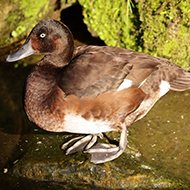
Two Baer's pochard ducklings hatched at the Slimbridge Wetland Centre.
A critically-endangered pair of ducklings have hatched at a wildlife reserve in Gloucestershire.
The two Baer's pochard ducklings arrived at the Slimbridge Wetland Centre in June – the first time that the centre has successfully bred the species.
Phoebe Vaughan, deputy living collections manager at Slimbridge, said: “The Baer’s pochard is the most recent in a long list of ‘little brown ducks’ to need our help and understanding in recent decades. The Aviculture team is thrilled to be able to do our bit for raising awareness of both the Baer’s pochard and also incidentally the Madagascar pochard, which this little family are representing for us so beautifully.
“When you make habitat, they will come, they will breed, and they will thrive! This is such a valuable message to our visitors and future generations.”
In 2012, the International Union for Conservation of Nature (IUCN) listed the Baer's pochard as critically endangered. Once common across Eastern Asia, it is estimated that there are now fewer than 1,000 individuals remaining in the wild.
The Wildlife and Wetlands Trust’s Conservation Breeding Unit used Baer’s pochard, alongside Ferruginous duck, to trial equipment eventually used for the pochard soft release at Lake Sofia, Madagascar.
The Baer’s were not only physically perfect for assessing the suitability of the equipment, but also WWT were able to consecutively raise their species profile.
Image (C) Slimbridge Wetland Centre.



 The Veterinary Medicines Directorate (VMD) is inviting applications from veterinary students to attend a one-week extramural studies (EMS) placement in July 2026.
The Veterinary Medicines Directorate (VMD) is inviting applications from veterinary students to attend a one-week extramural studies (EMS) placement in July 2026.